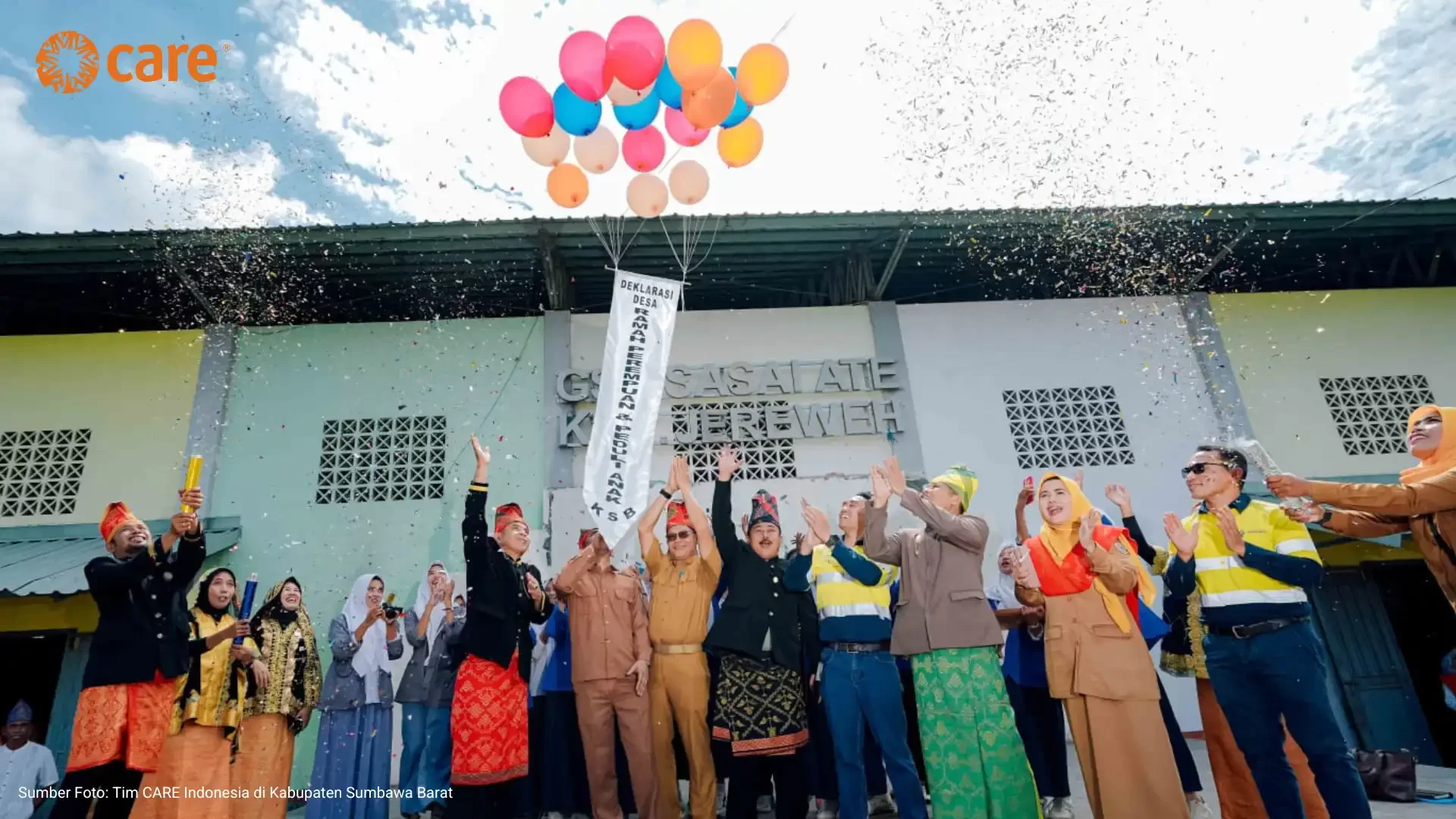The 2023 Indonesian Health Survey by the Health Development Policy Agency reported a stunting prevalence rate of 29.2 percent in Bandung District. CARE Indonesia with funding from the Indonesia Deposit Insurance Corporation (LPS), has initiated stunting reduction acceleration program in the Pangalengan Sub District, Bandung District, West Java.
The Chairman of LPS Board of Commissioners, Purbaya Yudhi Sadewa, Ph.D., in his remarks during the stunting reduction acceleration program kick off (4/10) at the Marga Mukti Village Head Office, Pangalengan Sub District, stated that this initiative, which is part of the LPS Peduli Bakti Bagi Negeri social assistance program, aims to reach children suffering from stunting, underweight, and wasting, as well as expected mothers with Chronic Energy Deficiency (CED) anemia, and breastfeeding mothers. The program will involve participants from three villages: Banjarsari Village, Sukamanah Village, and Marga Mukti Village.
“The assistance provided is aimed to have positive impact on future generations. We target to raise public awareness on the importance of nutrition and the health of children and expected mothers among parents and the community at large,” said Purbaya.
The program launch was attended by various stakeholders, including Ruli Hadiana, Assistant for Government and People’s Welfare of Bandung District, representing
the Acting Head of Bandung District; Esti Andayani and Dr. Agus Prabowo, Members of the YCP Supervisory Board; representatives from LPS management; the Bandung District Stunting Reduction Acceleration Team; Pangalengan District officials; village officials; coordinators of the Healthy Kitchen Group; and representatives from the local community.
Ruli Hadiana welcomed the collaboration for accelerating the reduction of stunting in Pangalengan District. He emphasized that reducing stunting prevalence is one of the key programs of the Government of Bandung District which requires support and participation from all parties, including corporations and community organizations.
“The government expresses its gratitude for the collaboration between LPS and CARE in addressing stunting, as this is a national program, particularly important in Bandung District, which has been a focal point in efforts to lower stunting prevalence. Hopefully, through this initiative, LPS will continue to support CARE, and we will all benefit from it, making it a model. We hope that Bandung District’s target of reducing stunting prevalence to 17% will eventually be achieved,” he said.
According to Dr. Abdul Wahib Situmorang, CEO of CARE Indonesia, the implementation of the stunting reduction acceleration program in Pangalengan Sub District will adopt
a holistic approach through specific and sensitive interventions. Specific interventions to improve the health and nutritional status of mothers and children will include support for the development of nutrition gardens and the management of a Recovery Supplementary Feeding (PMT) program. This will be carried out by 12 Healthy Kitchen (Dapur Sehat / DASHAT) groups, involving 72 women cadre members who will coordinate with community health centers (Puskesmas), village authorities, and local community representatives. These 12 groups willensure the implementation of the PMT program over a 90-day period. On the same period, sensitive interventions will also be conducted, focusing on raising public awareness about healthy living behaviours as well as providing parenting classes.
“The program participants will focus on approximately 240 children under five who are experiencing stunting, underweight, and wasting, as well as expected mothers with Chronic Energy Deficiency (CED), anemia, and breastfeeding mothers, until December 2024. With the support of the DASHAT women cadres, who have previously undergone capacity development training by CARE and the issuance of decrees (SK) by the village authorities, the program’s implementation will ensure that all activities, such as the establishment of nutrition gardens, series of training, and assistance for participant families, are carried out and monitored comprehensively,” said Abdul.
Abdul added, program monitoring will be conducted in detail through field supervision and real-time tracking via the CARE Stunting Reduction Dashboard every time PMT (Supplementary Feeding) is distributed. Additionally, regular monitoring will be conducted every two weeks, monthly, and quarterly to ensure that the implementation results in improved nutrition and understanding among participants. “Consistency in monitoring and evaluation is crucial for us, which is why it will be carried out in several stages. It is not only about the community; the involvement of other stakeholders, such as village officials, government institutions, and community organizations, is essential in assessing the impact, effectiveness, and efficiency of the program,” he explained.
Iis Sumiyati, one of the Dapur Sehat cadres from Banjarsari Village, stated that real-time monitoring of each PMT (Supplementary Feeding) delivery and gradual supervision have already been conducted. According to her, after two weeks of implementing the PMT, monitoring of children’s weight and height, as well as the health condition of expected mothers receiving PMT, has shown positive results. “After two weeks of PMT, we conducted weight and height measurements for the children and monitored the condition of expected mothers. Alhamdulillah, the results were very satisfying. In fact, the children receiving PMT showed noticeable development. Alhamdulillah, there was progress. Some children gained up to 1 kilogram in weight, and their height increased by 2-3 centimeters. The parents were also grateful and thanked us for helping their children,” she said.
Writer: Swiny Adestika





